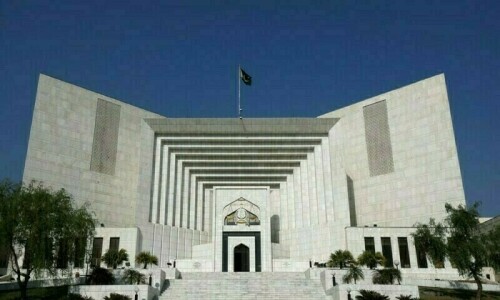WASHINGTON, Jan 23: A single country — Pakistan — has become ground zero for the terrorist threat that America faces, warns John Kerry, the 2004 US presidential candidate who now heads the powerful Senate Committee on Foreign Relations.
“The consensus among our intelligence agencies is that top Al Qaeda leaders are plotting their next attack from Pakistan, where the prevalence of religious extremists and nuclear weapons make that country the central, crucial front in our struggle to protect America from terrorism.”
In an editorial piece in The Washington Times, Senator Kerry recalls that the chairman of the US Joint Chiefs of Staff, Admiral Mike Mullen, has called the Afghan-Pakistan border region the “site of planning for the next attack” on the United States.
“Pakistan is under enormous pressure from all sides, from tensions with India to a ferocious insurgency in the tribal belt to a financial crisis that threatens the solvency of the Pakistani state,” he notes.
“And all of this is being held together by a fledgling civilian government not even a year old. For our sake and theirs, America must do more to help Pakistan.”
Crucial to the US effort to help Pakistan will be finding a winning regional strategy that recognises the centrality of Pakistan’s relationships with neighbours such as Afghanistan and India, he adds.
Emphasising Pakistan’s importance in the war in Afghanistan, Senator Kerry notes: “It has become conventional wisdom that the war in Afghanistan can be lost in Pakistan … what is often overlooked, however, is that the opposite is true as well: Violent instability in Afghanistan can undercut essential counter-insurgency efforts in Pakistan.”
Senator Kerry argues that Pakistan’s success in exerting control over its tribal areas depends on US and Nato forces getting the resources they need to accomplish their mission on the Afghan side of the border.
The aftermath of the November terror attacks in Mumbai, he added, reminding the US that getting Pakistan to focus its military on extremist sanctuaries that endangered American troops also depended on lowering tensions with India.
“We must work assiduously to help Pakistan and India to find a path back to the bilateral peace talks which were disrupted by the Mumbai attacks.”
Non-military aid
Noting that a military strategy alone cannot prevail on either side of the border, Mr Kerry argues for providing long-term political, economic, and development support to Pakistan, particularly in the NWFP and Fata.
“This is why I will seek swift passage of the Enhanced Partnership with Pakistan Act, which would triple non-military assistance to Pakistan through projects that will directly support the Pakistani people, strengthen democratic institutions, promote economic freedoms, and encourage investment in the agriculture, education and infrastructure sectors,” he writes.
“While I believe President Asif Ali Zardari, Army Chief General Ashfaq Parvez Kayani and Lt.Gen Ahmed Shuja Pasha, the intelligence chief, are credible in their commitment to defeating the militant factions threatening their country, as always it will be the follow-through that counts,” he adds. “As vital as civilian aid will be in Pakistan’s success, we also need to provide the tools to fight the extremists.”
Financial crisis
He favours providing electronic detection and communications equipment, helicopters that can move swiftly in the inhospitable terrain of the tribal belt and other equipment to Pakistan to fight the terrorists.
“We can do this and still demand greater accountability from Pakistan’s military,” he adds.
Senator Kerry notes that Pakistan is experiencing a dire and crippling financial crisis. In just one year, the country’s reserves have declined 75 per cent to $3.45 billion, forcing Pakistan to turn to the International Monetary Fund for a rescue package.
“America must lead an international effort to protect Pakistan from financial collapse,” he writes.
Senator Kerry also advises Pakistan’s leaders to act responsibly in the months ahead -- but concedes that “by necessity they will also look increasingly to the international community for support”.“Passage of the partnership act will be a good start, but not enough to stave off the risk that Pakistan’s fragile civilian government will be shaken by severe economic unrest,” he warns.
“Future international aid packages should include verifiable guarantees that the money will be spent on economic development that helps the Pakistani people.
“For all its challenges, Pakistan remains a vital partner in our efforts against Al Qaeda’s global insurgency,” he concludes.












































Dear visitor, the comments section is undergoing an overhaul and will return soon.